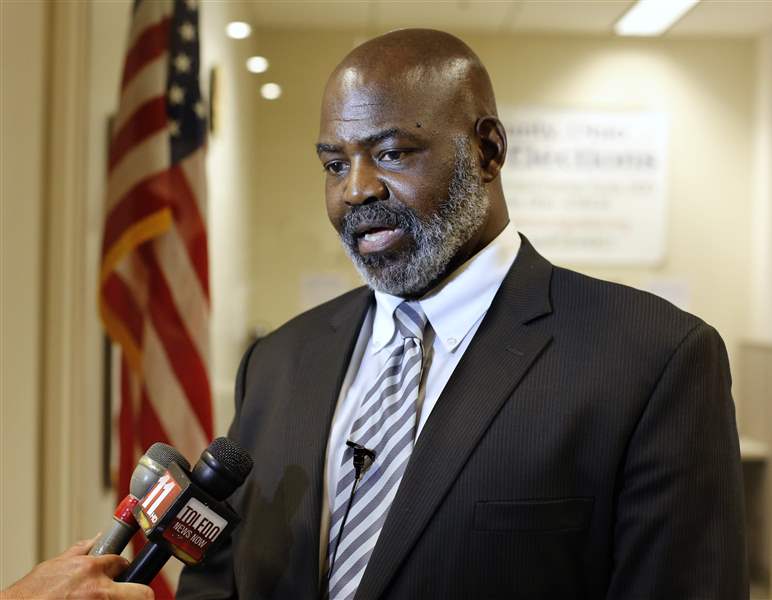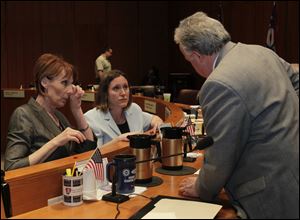
BELL ADMINISTRATION COMPROMISE
3 shelters may get $100,800 after all
Money offered from general fund
5/24/2013
Toledo Mayor Mike Bell talks with the media.
The Blade/Dave Zapotosky
Buy This Image

Denise Fox, of Aurora House, left, and Renee Palacios, of Family House, center, speaking with city council member George Sarantou.
Three Toledo homeless shelters that faced losing some federal funding, then got a reprieve from city council only to have that vetoed by Mayor Mike Bell, could actually get the money they desire after all.

Toledo Mayor Mike Bell talks with the media.
The Bell administration said on Thursday it would ask council next week to approve taking $100,800 out of the city's austere general fund to help bail out Aurora House Project, LaPosada, and Family House.
“There is obviously a need for the homeless shelters,” said Deputy Mayor Steve Herwat. “We didn't want them to getting caught up in the discussion regarding HUD regulations and were they providing programs that meet those needs. The best answer was to provide the money from the general fund, which won't have HUD regulation strings attached.”
If approved, it would end a long-running conflict that pitted the needs of some shelters backed by a majority of councilmen against the Toledo Lucas County Homelessness Board and its recommendations for allocating Community Development Block Grant funding that were backed by the Bell administration.
Under the latest olive-branch option offered by the Bell administration, Aurora, a shelter for homeless women and their children at 1035 North Superior St., would get an additional $28,634; LaPosada, a shelter for families at 435 Eastern Ave., would get an extra $8,000, and Family House, a family shelter at 669 Indiana Ave., would get an extra $64,166.
Those figures would restore each shelter to the same amounts received last year in block-grant funding.
Under the homelessness board plan the Bell administration submitted last week to the U.S. Department of Housing and Urban Development, Aurora gets $29,033 in CDBG money, down from $57,667 last year, while LaPosada and Family House would get nothing.
Family House director Renee Palacios, who was scrambling to manage a $79,000 reduction from last year's funding that included the lost $64,166 and less Emergency Solutions Grant money, said she was happy city council and Mayor Bell had reached a compromise.
“As long as we have the funding we need to continue the programs, that is all I care about,” Ms. Palacios said.
Shaun Reneau, a homeless man who lives at the shelter with his three children, ages 5, 3, and 22 months, relies on child care provided there while he is working at his assigned job to receive public assistance.
Without the city bailout, that toddler child-care program was slated to be shut down.
“The main idea is to get out as quick as you can,” Mr. Reneau said. “My goal is to get a place for me to get situated. It makes me feel bad enough that I had to bring my kids here and put them through this.”
Also under the recommendations sent to HUD, St. Paul's Community Center, 230 13th St., will get $20,500 in block-grant money -- about half of what it previously got. Family Outreach Community United Services, Inc., 283 Ashland Ave., will get $77,282 and Harbor House, a shelter for homeless and chemically dependent women at 3322 Cherry St., will get $14,700.
Different shelters will also get different allocations of Emergency Solutions Grant money.
Councilman Adam Martinez said the compromise with Mayor Bell includes making the process of deciding the recommendations for CDBG and ESG funding more transparent.
“Both sides were able to put egos aside and move forward,” he said.
The process of deciding how to distribute block-grant money started in January and included getting recommendations from a 10-member “Community Review Committee” run through the city's Department of Neighborhoods. A separate committee run through the homelessness board made recommendation for CDBG and ESG funding to the shelters operating under its umbrella.
Some shelter directors have said the homelessness board is too fixated on “rapid-rehousing” and have sacrificed money for other essential help given to homeless people.
They also criticized the so-called “centralized intake” process, under which anyone seeking shelter must call the United Way's 211 number for placement, that was enacted by the city and the homelessness board against many shelters' wishes.
Deb Conklin, the homelessness board's executive director, said HUD requires more efforts toward rapid rehousing, which aims to put people in permanent housing. She also said she stands by the original funding recommendations.
When told of the mayor's plan to shift general fund money to the shelters, Ms. Conklin said she wasn't consulted about the decision.
“I can't say what we would do with any of our recommendations if we knew general-fund money was going to programs,” she said. “We don't believe our recommendations would have made those agencies unable to do their jobs. ... It sounds to me like people are getting that money because they lobbied for it and it wasn't out there for everyone to compete for.”
Part of the debate between council and the mayor last week included Mr. Bell's insistence that council had no authority to change the recommendations, so he submitted the plan to HUD without its approval.
A HUD official in Cleveland said the internal city politics were of no concern.
"To be perfectly honest with you, we just want something that works. We don't try to tell local governments how to run their businesses as long as they're effective," said Doug Shelby, director of the department's Cleveland field office, which handles 35 northern Ohio counties, including Lucas County.
Mr. Shelby said, however, that HUD was not taking an official position on whether Toledo's central-intake system or its decentralized shelters are more worthy of block-grant funds.
"We can't judge an application until we get it," he said.
Ken Leslie, a homeless advocate, said the reason Toledo does not have a visible homeless problem is because there are enough shelter beds to accommodate those in need.
The city has about 1,000 homeless residents, based on an annual survey done each January.
Mr. Leslie, a Tent City co-founder, is a former member of the Toledo Area homelessness board. He said the spat between Mayor Mike Bell and the council over block-grant funds "has nothing to do with the homeless."
"It's about both of them [Mayor Bell and council] trying to assert power. The only logical outcome of that is that people will end up in camps near the river."
Mr. Leslie defends a system which would allow individual shelters to receive direct CDBG funds, instead of having them go to a central intake system. He said the latter is an unnecessary duplication of services that drains badly needed money for the shelters.
“Mr. Leslie is entitled to his opinion, but our outcome was not demonstrating a reduction in homelessness in our community," Ms. Conklin responded, "so everything we put into place now is geared toward reducing, preventing, and ending homelessness.”
Toledo’s federal Community Development Block Grant allocation last year was $6.83 million. The plan submitted to HUD includes details about where all the money will go. Much is kept by the city's neighborhoods department for programs.
Toledo's Emergency Solutions Grant last year was $610,343, which city officials expect to drop by at least 5 percent this year. The city also gets $1.68 million in federal HOME housing subsidies.
The mayor's plan offered Thursday did not address the loss of about $60,000 in CDBG funding for United North Inc., which wanted to use it toward converting the former St. Hedwig School in North Toledo’s Polish Village into 41 apartments for low-income seniors.
That plan was cut out of the original block-grant recommendations made by the Department of Neighborhoods committee. Council's revisions reinstated it, but it was cut again with Mayor Bell's veto.
Mr. Herwat said if United North gets needed tax credits for the projects, the mayor has committed to asking council for approval to use some of Toledo HOME funding allocation for that development.
Staff writer Tom Henry contributed to this report.
Contact Ignazio Messina at: imessina@theblade.com or 419-724-6171.